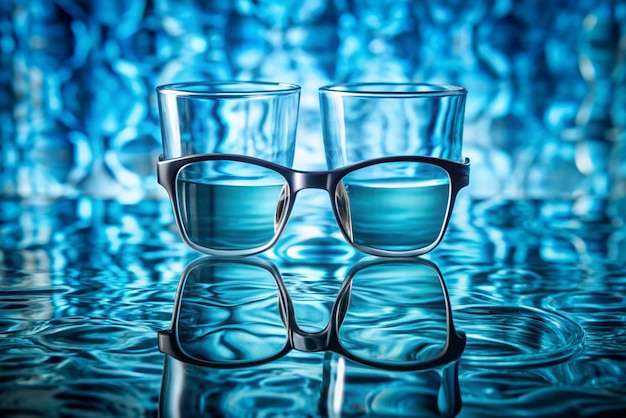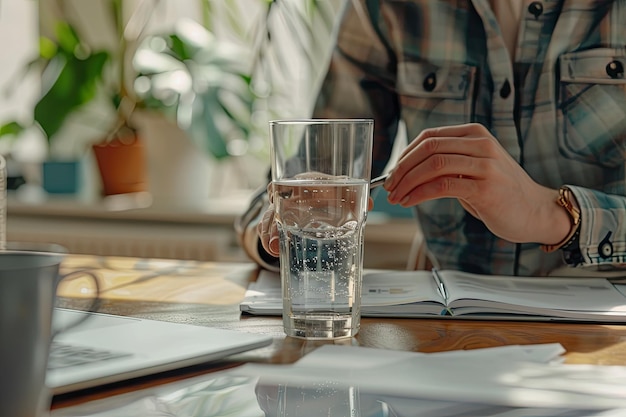Quick Read
8 Glasses a Day: The Importance of Staying Hydrated with Water
Staying hydrated is crucial for maintaining good health and optimal body function. The human body is composed of about 60% water, and every system in our body requires water to function effectively. One common recommendation for daily water intake is drinking eight glasses a day. In this article, we will discuss why it’s essential to stay hydrated and the benefits of drinking water, specifically focusing on the eight glasses a day recommendation.
Why Is Staying Hydrated Important?
Our bodies use water in various ways, including temperature regulation, maintaining the balance of bodily fluids, transporting nutrients, and supporting overall health/health/” target=”_blank” rel=”noopener”>health
. When we don’t get enough water, our body can begin to suffer. Dehydration can lead to fatigue, dizziness, and even more severe health issues like heatstroke or kidney damage.
What Happens When We Don’t Drink Enough Water?
Dehydration can cause various symptoms, such as dry mouth, increased thirst, dark-colored urine, fatigue, dizziness, and headaches. In more severe cases, dehydration can lead to more serious health issues.
Benefits of Drinking Water
Drinking water offers numerous benefits, including:
- Improves cognitive function: Dehydration can impair brain function, whereas proper hydration can enhance focus, memory, and mood.
- Boosts athletic performance: Proper hydration is essential for athletes to maintain optimal performance and reduce the risk of heat-related injuries.
- Aids in weight loss: Water helps regulate appetite, and drinking it before meals can help reduce caloric intake.
- Detoxifies the body: Water helps eliminate waste from the body through urine, sweat, and feces.
How Many Glasses of Water Should We Drink a Day?
The eight glasses a day recommendation comes from the National Academies of Sciences, Engineering, and Medicine. They suggest men consume about 15.5 cups (124 ounces) of water per day, while women need approximately 11.5 cups (91 ounces). However, this amount includes water from food and other beverages, so the actual amount of water to drink is less.
Conclusion
Staying hydrated is vital for our health and wellbeing, and drinking eight glasses of water a day is an easy way to ensure we get enough. The benefits of proper hydration extend beyond just preventing dehydration, including cognitive function, athletic performance, weight loss, and detoxification. So grab a glass of water, sit back, and enjoy the countless benefits this simple yet powerful elixir has to offer!

The Significance of “8 Glasses a Day”: A Deep Dive into the Origins and Health Benefits
The “8 Glasses a Day” rule is a widely-known recommendation for maintaining adequate hydration. This simple yet powerful guideline suggests that individuals should consume approximately 8 glasses or 64 ounces (1.9 liters) of water daily to ensure optimal health. But where did this recommendation come from, and what makes it so significant?
Origins and History of the Recommendation
The origins of the “8 Glasses a Day” rule are somewhat unclear, with various sources attributing its inception to different organizations and time periods. Some believe it originated from the U.S. National Institutes of Health in the 1940s, while others claim it was first suggested by a food and nutrition advisory committee in the late 1970s. Regardless of its exact origins, this recommendation has stood the test of time and continues to be a popular benchmark for hydration today.
The Significance of the Number 8
The number 8 in the “8 Glasses a Day” rule signifies the recommended amount of water intake per day. Each glass is considered to be 8 ounces, which is approximately equal to one cup (237 milliliters). The significance of this number has been debated, with some arguing that it may not be enough for everyone and others contending that it is a reasonable starting point.
Importance of Staying Hydrated: Overview of Health Benefits
Staying hydrated is crucial for maintaining good overall health. Water plays a vital role in numerous bodily functions, including regulating body temperature, transporting nutrients and oxygen to cells, and maintaining proper muscle function. Dehydration, on the other hand, can lead to a host of unpleasant symptoms and even more severe health issues if left unchecked. Some potential consequences of chronic dehydration include dizziness, fatigue, headaches, kidney stones, urinary tract infections, and in extreme cases, heat stroke or even death.
Why This Topic is Relevant Today
With increasingly sedentary lifestyles, caffeine and alcohol consumption, and a variety of other factors that can impact hydration levels, ensuring adequate water intake remains a pertinent health concern for individuals today. The “8 Glasses a Day” rule serves as a simple and easy-to-remember guideline to help people make informed choices about their daily water intake and take steps towards maintaining optimal health.
Understanding Dehydration
Definition and Symptoms
Dehydration refers to the condition when your body loses more fluids than it takes in, resulting in an imbalance between water and electrolytes. Symptoms of dehydration may include: frequent thirst, dry mouth, dark-colored urine, dizziness, lightheadedness, and infrequent urination. In severe cases, dehydration can lead to confusion, seizures, unconsciousness, or even death.
Causes of Dehydration
Physical Activity and Sweating
Excessive sweating during physical activity can lead to fluid loss and dehydration if proper hydration measures are not taken. Sweating is the body’s natural response to regulate temperature, but it can result in significant water loss, especially during prolonged or intense exercise.
Illnesses: Vomiting, Diarrhea, or Fever
Illnesses like vomiting, diarrhea, and fever can cause significant fluid loss and lead to dehydration. These conditions can impair the body’s ability to absorb fluids efficiently and increase the risk of dehydration, especially in young children and older adults.
Environment and Diet
Environmental factors such as high temperatures and humidity can increase the risk of dehydration by causing excessive sweating. Additionally, certain foods or diets that are low in water content, like processed foods or diets high in caffeine and alcohol, can contribute to dehydration.
Consequences of Dehydration
Short-term Effects on the Body
Mild to moderate dehydration can cause fatigue, dizziness, and weakness. In severe cases, it can lead to complications like heatstroke, seizures, or shock.
Long-term Effects on the Body
Chronic dehydration can have long-term impacts on various organs and systems, including:
- Kidneys: Dehydration can impair kidney function and lead to kidney stones or urinary tract infections.
- Brain: Severe dehydration can lead to brain damage, confusion, seizures, or even coma.

I Why Water is the Best Choice for Staying Hydrated
The role of water in the body:
Water is an essential nutrient that plays a vital role in maintaining our body’s functions. Regulating body temperature: Water helps regulate body temperature through perspiration, which is essential for maintaining a stable internal environment.
Lubricating joints and protecting organs: Water acts as a lubricant for joints and helps protect organs, including the brain, spinal cord, and other vital tissues.
Aiding digestion, absorption, and waste elimination: Water is essential for the digestive system to function effectively, helping to break down food and absorb nutrients. It also plays a role in waste elimination, ensuring that the body can eliminate waste products efficiently.
Comparing water to other fluids: advantages and disadvantages
Sports drinks:
Sports drinks have their place during intense physical activity that lasts for more than an hour or in situations where individuals are sweating profusely. However, consuming sports drinks regularly instead of water can lead to excessive sugar and sodium intake.
Juice, tea, and coffee:
While these beverages provide essential nutrients, they contain high amounts of calories, sugar, and caffeine. Juice: contains natural sugars that can contribute to weight gain when consumed in excess.
Tea and coffee: contain caffeine, which can lead to dehydration and interfere with sleep patterns if consumed in large quantities.
Comparing water to these beverages:
Water is the best choice for maintaining optimal hydration levels due to its lack of calories, sugar, and caffeine.
The importance of drinking water before, during, and after physical activity
Pre-hydration strategies for athletes and active individuals:
Proper hydration before physical activity is crucial to maintain optimal performance. Drinking water 1-2 hours before exercise can help prevent dehydration during the activity.
Rehydrating during exercise to maintain performance:
Drinking water during physical activity is essential to replace fluids lost through perspiration and maintain performance levels.
Post-workout recovery: refueling the body with water and nutrients:
Post-workout, it’s important to rehydrate the body and refuel with nutrients to aid in recovery. Drinking water is a key component of this process, ensuring that the body has the necessary fluids to function optimally and repair damaged tissues.

Tips for Implementing the “8 Glasses a Day” Rule
Creating a daily hydration plan: setting realistic goals and tracking progress
Setting a goal to drink “8 glasses a day” might seem daunting at first. But with a well-planned strategy, it can be an achievable and beneficial habit. Start by setting realistic goals based on your current water consumption habits. You might not be able to go from drinking none or very little water to eight glasses overnight, but you can gradually increase your intake over time. Keep track of your progress using a hydration log or a tracking app on your phone. This will help you see your improvement and stay motivated to continue.
Making water consumption a habit: incorporating it into your routine
Making drinking water a regular part of your daily routine can help ensure that you get enough hydration throughout the day. One way to do this is by setting specific times to drink water. For example, you could aim to drink a glass of water with each meal or snack, or at regular intervals throughout the day, such as every hour. You can also use reminders to help you remember to drink water regularly. This could be a phone app that sends notifications or a water bottle with measurement markings that reminds you to fill up at certain points throughout the day.
Drinking water at specific times throughout the day
Drinking water at regular intervals throughout the day can help ensure that you stay hydrated and avoid dehydration. Try to make drinking water a habit by setting specific times to drink it, such as with meals or snacks, or at regular intervals throughout the day.
Using reminders, such as phone apps or water bottles with measurement markings
Reminders can be an effective way to help you remember to drink water regularly. There are many phone apps available that can send notifications or reminders to help you stay hydrated, or you could use a water bottle with measurement markings to help you track your progress and ensure that you’re drinking enough.
Enhancing the taste of water: adding natural flavors using fruits or herbs
Adding natural flavors to your water can make it more enjoyable to drink and help you stay hydrated throughout the day. Infusing your water with fresh fruits or herbs is a simple and effective way to add flavor without adding calories or sugar. For example, you could try adding slices of lemon, lime, cucumber, or berries to your water for added flavor and health benefits.
Infusing water with fresh ingredients for added health benefits and flavor
Infusing your water with fresh fruits or herbs is a simple and effective way to add flavor without adding calories or sugar. Not only does it make the water more enjoyable to drink, but it also provides additional health benefits from the natural ingredients. For example, lemon is rich in vitamin C and antioxidants, while cucumber can help improve digestion and provide a refreshing taste.
Addressing potential challenges: dealing with perceived barriers to drinking enough water
There are many challenges that can make it difficult to drink enough water throughout the day, from aversion to plain water to busy schedules or travel. Here are some tips for overcoming these challenges and staying hydrated despite your circumstances:
Overcoming aversion to plain water
If you find yourself avoiding plain water due to its taste or lack of flavor, try adding natural flavors as described above. You could also try sparkling water, which can provide a more interesting texture and feel more refreshing than still water.
Dealing with busy schedules or travel
Staying hydrated can be especially challenging when you have a busy schedule or are traveling. Try to make drinking water a priority by carrying a water bottle with you and taking regular sips throughout the day. You can also try infusing your water with fresh fruits or herbs to make it more enjoyable to drink on the go. Finally, try to plan ahead by bringing a reusable water bottle with you when you travel or have long days, so that you always have access to clean drinking water.

Conclusion
As we’ve explored throughout this article, staying hydrated is an essential aspect of maintaining good health and well-being. Dehydration can lead to a host of unpleasant symptoms, ranging from mild ones like fatigue and headaches to more serious conditions like heat stroke or kidney damage. That’s why it’s crucial to make water a priority in your daily life and follow the “8 Glasses a Day” rule, which recommends consuming approximately 2 liters (about 67 ounces) of water per day. This is just an approximate guideline, as individual needs may vary based on factors like age, sex, activity level, and climate.
Recap of the Importance of Staying Hydrated
Staying hydrated: is essential for maintaining good health and well-being.
Encouragement for Readers
We encourage readers: to make a conscious effort to drink enough water every day. This simple habit can significantly improve your overall health and quality of life. Here are some tips to help you stay hydrated:
- Keep a water bottle with you at all times.
- Set reminders to drink water throughout the day.
- Infuse your water with fruits, herbs, or other flavorings to make it more appealing.
- Limit your intake of caffeinated and alcoholic beverages, which can dehydrate you.
Additional Resources and References
For further information on hydration and health:
By making water a priority in your daily life, you’ll be taking an important step towards better health and well-being.




